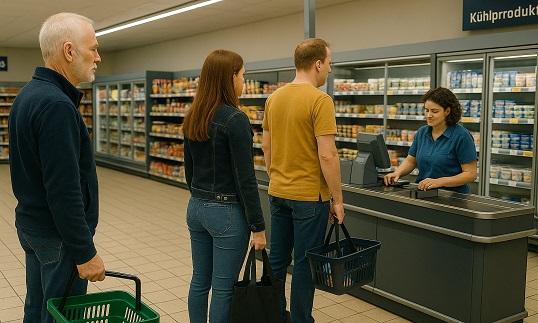
Germans are world-famous for their love of rules, punctuality, and order. But when it comes to standing in line, things get… complicated.
Tourists often expect tidy, disciplined queues everywhere in Germany – after all, this is the land of precise train schedules and Ordnung muss sein (“There must be order”). Yet at bakeries, bus stops, or market stalls, they’re sometimes greeted not by a line, but by an ambiguous cluster of people loosely hovering.
So do Germans queue? Absolutely. Just not always in the way outsiders expect.
This article explores how queuing works (and sometimes doesn’t) in Germany. You’ll learn the unwritten rules, regional quirks, and how to avoid awkward encounters at the back – or front – of the line.
The German Approach to Order: Why This Matters
To understand queuing in Germany, you have to grasp a bigger idea: order isn’t always visible. Germans don’t need ropes or floor markings to know who’s next. Often, people arrive and silently register their place based on who was there before them.
The system relies on mutual awareness, spatial memory, and politeness rather than physical lines.
This habit reflects wider German values:
- Unspoken social contracts
- Minimal fuss or confrontation
- Efficiency without spectacle
Where Germans Form Perfect Lines
In many contexts, especially those involving bureaucracy or transportation, Germans form classic, orderly queues.
Expect straight lines and firm boundaries at:
- Supermarkets
- Airports and boarding gates
- Train station ticket machines
- Government offices (Einwohnermeldeamt, Bürgerbüro)
- Banks and post offices
- Toilets in public buildings
People wait their turn. Cutting in is rare and likely to provoke a firm “Ich war zuerst dran.” (“I was here first.”)
Even so, don’t expect idle chit-chat or dramatic sighs. Germans tend to queue calmly and quietly, reflecting the same public etiquette seen across the culture.
Where Queues Get… Looser
In less formal or more dynamic spaces, German queues become more abstract. You’ll see this at:
- Bakery counters
- Butcher shops
- Outdoor market stalls
- Bus stops and trams
- Cafeterias and food courts
In these places, people often arrive and hover, mentally noting who’s already there and who came after. There’s no physical line – but everyone knows their spot.
If someone walks in and tries to order ahead, they’ll likely hear:
“Entschuldigung, ich glaube, ich bin dran.”
(“Excuse me, I believe it’s my turn.”)
No one shouts. No one makes a scene. But the rules are there – and politely enforced.
Regional Differences
Germany is not monolithic. Queuing behavior varies by region, influenced by local culture, pace of life, and formality.
Southern Germany (Bavaria, Baden-Württemberg):
- Expect more traditional formality.
- People queue clearly and speak up if you cut.
- Kehrwoche-style neighbor awareness applies even in lines.
Berlin:
- More fluid and self-organized.
- People respect order, but not always visibly.
- You’re expected to know your place without reminders.
Hamburg and the North:
- Generally orderly but more reserved.
- Queueing is efficient, with less verbal interaction.
The East (Saxony, Thuringia, etc.):
- Mixed habits depending on the size of the city and context.
- Rural areas may rely more on silent recognition than rigid lines.
The Bakery Protocol: A National Case Study
Let’s take one of the most common (and confusing) scenarios for foreigners in Germany: the bakery.
You walk in and see a crowd of six people. No queue. Just hovering.
What do you do?
Step-by-Step:
- Observe who came in before you. This matters.
- Stand slightly behind or to the side of the last person.
- When the server asks “Wer ist dran?” (“Who’s next?”), speak up only if it’s clearly your turn.
- If unsure, ask: “Sind Sie vor mir?” (“Are you ahead of me?”)
Most customers will respond with a nod or a “Ja, ich bin dran.”
Trying to rush the process or awkwardly jump in will not go unnoticed.
Bus Stops and Tram Platforms: The Invisible Queue
At many German bus stops, there are no lines. People wait scattered around the shelter, looking at their phones or quietly staring into space.
But when the bus arrives?
- Everyone moves toward the door.
- The first person there boards first – unless someone elderly or with a stroller is present.
- Pushing or jostling is rare, and if it happens, you’ll likely get a glare or curt word.
Again, there’s order – but it’s self-regulated and often silent.
When There’s No Order: What Germans Do
Occasionally, situations arise with no clear queue – for example, multiple doors at a train station or chaotic crowds during festivals.
Even then, Germans rarely lose their cool. They:
- Make eye contact to establish order
- Use short, polite phrases like “Ich glaube, Sie waren vor mir.”
- Avoid shouting or confrontation
- Trust others to do the right thing
This expectation of cooperation is a hallmark of everyday etiquette in Germany – whether it’s splitting the restaurant bill (explained here) or observing Ruhezeiten.
Do Germans Ever Skip the Line?
In general, line-cutting is rare and socially frowned upon. However:
- In nightclubs, VIP culture or confidence may override the usual norms.
- In very busy bakeries, someone may step forward – but they’ll usually be corrected.
- At Christmas markets, chaos can take over – but most people still wait their turn.
If someone cuts in and you are affected, it’s perfectly acceptable to say something – politely. Germans value fairness, and most will appreciate you defending your spot.
Tips for Visitors and Newcomers
If you’re unsure how to queue in Germany, follow these tips:
- Observe first. Look at how others are positioning themselves.
- Don’t rush. Jumping ahead is a cultural faux pas.
- Ask, don’t assume. “Sind Sie dran?” is a magic phrase.
- Wait your turn quietly. Don’t use loud tactics to draw attention.
- Own your mistake. If you misstep, a quick “Oh, Entschuldigung!” fixes most things.
- Respect invisible queues. Germans remember who came in when – you should too.
German queuing habits may seem contradictory: structured in some places, vague in others. But they make sense when viewed through the lens of broader cultural patterns:
- Trust in social order
- Assumed personal responsibility
- Avoidance of unnecessary confrontation
- Value placed on fairness and civility
Just like with Kehrwoche, shoes-off rules, or quietness in public, Germans queue in a way that reflects their belief in mutual obligation without micromanagement.
Lining Up the German Way
So do Germans queue? Yes – but sometimes mentally rather than physically.
Their system depends on shared awareness, silent cooperation, and a strong sense of fairness. It might not be obvious to newcomers, but once you learn to read the cues – and respect the silence – it starts to feel natural.
The key is simple: pay attention, be patient, and don’t push. The rest will fall into place.
Continue Exploring the Everyday German Life & Etiquette Series:
- Everyday German Etiquette: The Unspoken Rules That Surprise Tourists
- Why Germans Always Separate the Bill: Dining Etiquette Explained
- Quiet Hours in Germany: How Noise Laws Shape Daily Life
- The “Kehrwoche” Phenomenon: Cleaning Duties in Shared Buildings
- Why Germans Take Their Shoes Off Indoors: A Look at Hausregeln
- Public Transport Etiquette in Germany: The Unspoken Social Code
- Silence in German Culture: Why Quietness Is a Virtue







